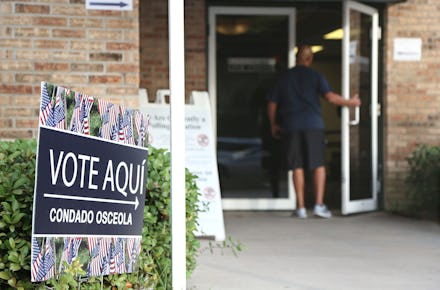Groups push back against efforts to disenfranchise voters of color in Florida and Georgia

As the November midterm elections approach, groups in Florida and Georgia are fighting against efforts to potentially disenfranchise voters of color.
The American Civil Liberties Union of Georgia sent a letter Tuesday to the Board of Elections and Registration in Randolph County, Georgia, which complained the county’s recent proposal to close seven of its nine polling locations would “deliberately” disenfranchise the voters who reside there — a majority of whom are black. The ACLU contended that the proposal to close the polling locations is “discriminatory, unjustifiable and violates the Voting Rights Act of 1965.”
“These polling place closures will virtually guarantee lower voter turnout in a Black Belt county that is predominantly African-American (60%), and will completely prevent rural voters without transportation (again, disproportionately African-American) from voting in person on Election Day,” the letter stated.
The Randolph County Board is currently considering the proposal, with a final decision set for Aug. 24.
“The timing of it is just bad,” Bobby Jenkins, head of the county Democratic Party, told the Albany Herald. “This is in the middle of the election cycle. People (are) voting in one place for the primary and then they would have to vote at another for the general, and that would just create mass confusion. If you combine those two things together, it would appear that this was a deliberate attempt to decrease the participants in the voting process. That’s why we said that it’s voter suppression.”
The organization noted in its letter the possibility of “continuing legal exposure” if the proposal goes through.
Florida groups sue for bilingual ballots
As the battle over voting plays out in Randolph County, Spanish-speaking Floridians are also fighting for their voting rights ahead of the November midterms.
Civil rights organizations Faith in Florida, Hispanic Federation, Mi Familia Vota Education Fund, UnidosUS and Vamos4PR sued Florida Secretary of State Ken Detzner and state county supervisors of elections in federal court Thursday, accusing them of violating the Voting Rights Act of 1965. The lawsuit is an attempt to force 32 Florida counties to provide Spanish-language ballots, election materials and assistance for the November midterm elections and beyond, as the plaintiffs allege that providing English-only materials makes “voting more difficult or effectively impossible” for voters whose primary language is Spanish.
The lawsuit is particularly for the benefit of Florida’s Puerto Rican population, which the Center for Puerto Rican Studies at Hunter College reported has reached more than 56,000 in the wake of Hurricane Maria. Many of these Puerto Rican-Americans were educated in Spanish-speaking schools in Puerto Rico and are not sufficiently proficient in English to use an English language ballot, the lawsuit noted.
The Voting Rights Act ensures all “persons who attended any number of years of school in Puerto Rico,” along with others who attended U.S. schools “in which the predominant classroom language was other than English,” cannot be denied the right to vote “because of his inability to read, write, understand or interpret any matter in the English language.”
“By not providing Spanish-language ballots or sufficient other Spanish language election materials and assistance, the Counties condition the right to vote of plaintiff class members on their ability to read, write, understand, or interpret the English language,” the lawsuit noted.
“The right to vote is a precious and fundamental right that is the heart of our democracy,” the lawsuit continued. “The loss of that right for the 2018 general election, and any subsequent elections, for [the plaintiffs] is an irreparable injury.”
In a statement to the Tampa Bay Times Detzner’s office said it would review the lawsuit, noting that “all supervisors of elections should continue making voting accessible for all voters including those whose first language is not English.” The statement added that statewide election materials are provided in both languages, and the Tampa Bay Times noted that Spanish election materials are already required in 13 Florida counties where Spanish speakers make up at least 5% of the voting age population.
The plaintiffs argued that before their legal filing, they had sent letters to the 13 largest counties named in the suit, demanding Spanish-language election materials. The counties “have stated that they will not provide Spanish-language ballots for the 2018 elections,” however, and no county has “formally committed” to providing Spanish election materials, the suit explained.
Hispanic Federation president José Calderón said in a statement quoted by the Hill that denying the right to vote is “wholly unacceptable anywhere in our country, and that goes even more so for ... communities that have endured a long history of voter suppression — like Spanish-speaking Latinos and other people of color in the state of Florida.”
Calderón said his group is “particularly concerned” about whether or not the Puerto Ricans who have settled in Florida since 2017’s deadly Hurricane Maria will be able to vote in their native language. “These recent arrivals to the state must be afforded every opportunity to exercise their right to vote on the mainland,” he said.